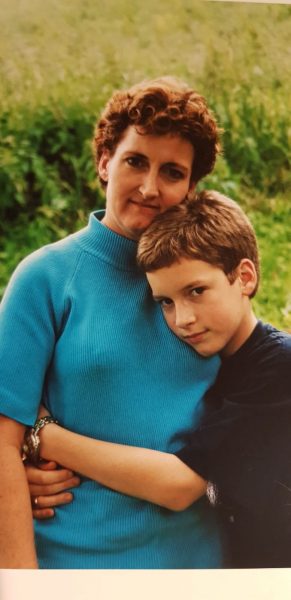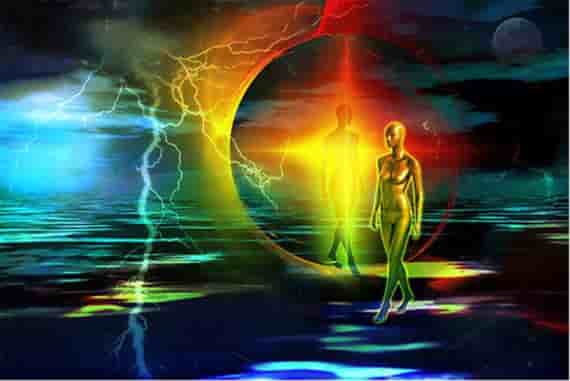Good news before we embark on this dreary subject. Robert is doing well. He says living independently was a lot harder than he thought, because every little thing exhausts him, even answering emails. I wished he had stayed with us another week or two, but he had to get back to his pups, so… Fortunately, he’s gaining strength and feeling better ever day. Keep sending him your love!
Channeling Transcript
Me: Let’s see. Okay, I know we’ve talked a lot about what happens in the afterlife when someone commits suicide, you know, how they’re treated.
Erik: Yeah.
Me: We also talked about how suicide is usually not someone’s destiny in that it’s not a pre-designed exit point, but that in some cases, like yours, it is. So why do some people choose suicide as part of the spiritual blueprint they create for their incarnation? I mean, so many of the blog members insist that you can’t choose suicide as part of your destiny, because it’s just not right, taking any life, including your own. But from my perspective, I think you can. Maybe that’s wishful thinking on my part, but—
Erik: No, you’re right, Mom. You can choose that type of death, um, I mean transition, when you plan your life. How ignorant for somebody to say, “You can choose all these other kinds of deaths, but you can’t choose this one.”
Me: Well, cut ‘em some slack, Erik, because I think there’s a lot of influence from different religions on the subject. It’s a taboo thing.
Erik: Nope. Ignorance.
Me: Erik! Play nice!
Erik, Jamie and I laugh.
Me: Or maybe I’m just being too nice, giving people the benefit of the doubt.
Erik: You’re always nice, Mom.
Me: Aw! You’re sweet, Erik! Okay, so can you name all the reasons, or at least some of the reasons for why someone would choose suicide as a destiny?
Erik: Um, one could be finding inner strength.
Me: Okay.
Erik: So that they can overcome themselves. One is to succumb to get in.
Me: Why would that be a choice?
Erik: It’s more of a breaking of boundaries or a breaking of structure.
Me: Oh, okay.
Erik: So, let’s say if you were into that heavy religious belief that suicide is taboo, it’s never the answer and you’re going to burn in hell if you do it.
Me: Um hmm..
Erik: That’s a rule in your life that’s binding you. So when you kill yourself to experience succumbing, you’re giving in to YOUR feelings, YOUR needs. Succumbing to YOURESELF would be breaking an external rule or structure. And that would teach others that the belief system doesn’t give room for the complete truth.
Erik: Another, which is one of the most common reasons, is when people know they’re going to come into a life that is extremely powerful and demanding on themselves.
Me: Yeah, to accelerate their spiritual growth?
Erik: Right, and some people won’t do it unless they know they have an out. If it gets to be too much for them, they do break and feel they can’t repair themselves, then they know that they can leave.
Me: So that’s one of the exit points they create for themselves. Like a safety valve on a pressure cooker.
Erik: Exactly. That’s generally the most common reason for suicide as a pre-designed exit point.
Me: Is there—of course you had such a great life, apart from your mental illness, so what was your reason?
Erik: Mine was to get out of my head, and I set myself up to have a very hard life, mentally, so that I could be better prepared to do the job I’m doing now. Just like you, Mom. You’ve had a really hard life, lot’s of drama and tragedy. That’s so you could have the understanding and compassion a healer and teacher needs to be effective. I needed to develop that compassion also so I could guide and help others from this side of the veil. It’s what I was meant to do.
Me: Are there any reasons someone might commit suicide to teach lessons to others?
Jamie listens for awhile, then starts chuckling.
Erik: First, it’s not like we’re wanting to be vindictive or “in your face,” but a lot of times, suicide is that final, “Fuck you.”
Me: Uh huh.
Erik: That, “Look what you’ve made me do!” We covered that part about you’re fully in control of your own actions so that’s all bullshit. To give away your power, you know, to say somebody made you do it is because that person isn’t strong enough and doesn’t want to take responsibility.
Me: Yeah.
Erik: So, it’s a huge “in your face” action, because it shows that the person needed such help but wasn’t able to express it. And so the people around you perk up. Often, they take on new positions in life. If they don’t fall apart from the suicide of their friend or family member, they take on new parts. Look at you, for example, Mom—able to help thousands of other people.
Me: Okay, so yeah, it can be a catalyst, a positive catalyst for other people, then?
Erik: Yes, but most people see it negatively, because of what they were taught about suicide when they came into this world. It’s bogus. Totally bogus.
Me: Okay, so anything else?
Erik: Oh, yeah. Some try to teach others about loss, some about the sanctity of life and the human experience.
Me: So can they learn about the sanctity of the human experience themselves, like they kill themselves, then they get over there and think, “Oh my god, I just wasted an opportunity!” Do they ever design it for that?
Erik: Uh, yeah. There are tons of regrets where when they were alive they couldn’t see five feet in diameter around them, but then with their death, they can see a lot more, and they realized how they shortchanged themselves.
Me: Yeah, exactly.
Erik: And yes, doing that, then there’s work to be done, because there were people’s lives that they were supposed to be involved with that they were supposed to affect. So they have to do all that work in spirit that they would have done if they remained alive. All that, the regrets and missed opportunities—that’s to teach the soul how important the human experience is to spiritual progress, not only for them, but others too. It’s a lot harder to get the work done over here in spirit.
Me: Okay, now, at first, you said your death wasn’t your destiny, and lately you’ve said it was. I always felt like it was. I could never imagine you as an old man with grandkids and stuff.
Erik: I was totally disoriented when I first got here, Mom. Mostly, I just felt (pause), it’s odd. It’s peaceful and I knew I did the right thing, but then I felt horrible watching the people I love, and to speak up and tell them that, yeah, this was the right thing for me to do—that’s just another stab right into their hearts.
Me: Yeah.
Erik: And a lot of people can’t accept that. You know, “How could your son, who you loved so much, and you believed they loved you do that to you?” And that’s an egocentric way of thinking about it. You’d be thinking just about yourself instead of the other person’s position, but again, that’s what our structure gives to us on planet earth.
Me: Yep, exactly. So you were disoriented; you thought it wasn’t your destiny, you thought you just kind of messed up, because you saw us grieving so much? Then you all of a sudden remembered it was your destiny, because you were supposed to be doing all this—what you’re doing now?
Jamie: He said this and you said this at the same time!
Me: Ha! How cool. I guess great minds think alike!
Erik chuckles.
Remember, all, the deadline for voting in the 2011 bloggies is looming near, so if you haven’t voted or coerced everyone on your Facebook friend list and email list, please, please do. If you’ve been putting it off, the time for procrastination is over. Just go to http://2011.bloggi.es and vote under the Best Religion Weblog. Thanks again! (I’ll bet you can’t wait until the deadline is over with so I won’t keep hounding you all! The vote closes 2/20/11, but I can’t remember the exact time.) Love you all!



